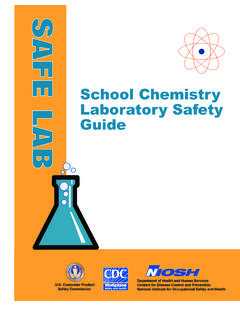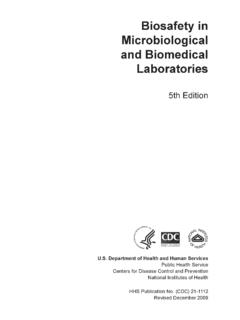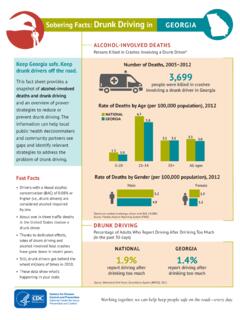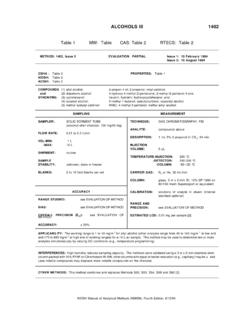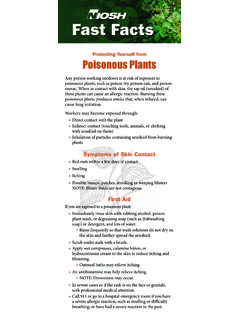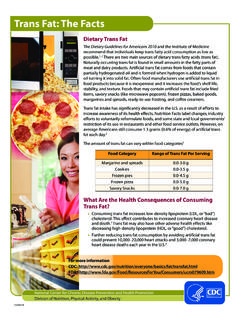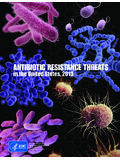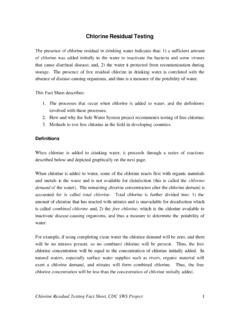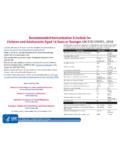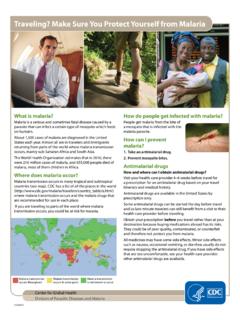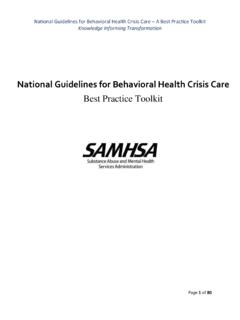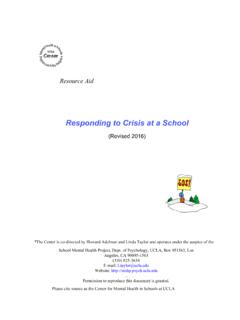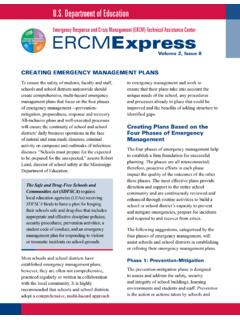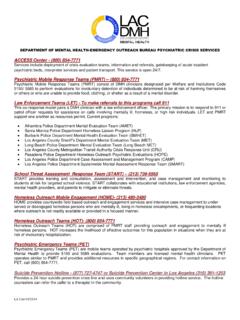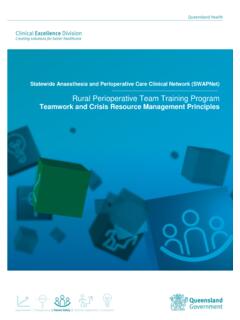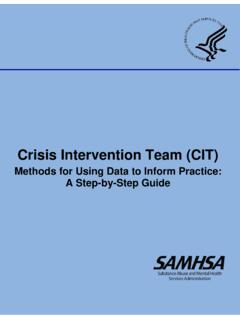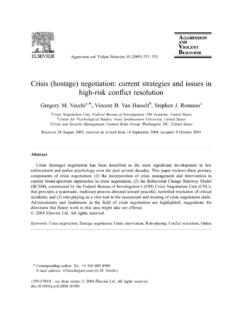Transcription of Judgment and Decision-Maiking Under Stress: An Overview ...
1 -8'*0(17 $1' '(&,6,21 0$.,1* 81'(5 675(66 . $1 29(59,(: )25 (0(5*(1&< 0$1$*(56 . 0 .RZDOVNL 3K ' . 3V\FKRORJLVW . 9 DXJKW 3K ' . 0 6 3 6 RFLRORJLVW . 1 DWLRL]DO ,QVWLWXWH IRU 2 FFXSDWLRL]DO 6 DIHW\ DQG +HDOWK . 3 LWWVEXUJK 5 HVHDUFK / XERUDWRU\O . stress, Judgment , decision-making, emergency management, mining paper discusses human Judgment and decision-making Under stress. The authors review selected recent literature across various disciplines and suggest a definition of stress within the context of decision-making during the management of emergencies. They also discuss fieldwork by the Pittsburgh Research Laboratory, NIOSH, which explores traumatic incident stress, the relationship between previous training and performance Under stressful conditions, and human behavior in underground mine fires.)))))))))
2 The authors assert that stress is one of the factors that decision-makers must contend with in most life-or-death situations. They suggest that a better understanding of individual's Judgment and decision-making activities while Under stress would yield a better understanding of how people reach the choices they make in emergencies. This enhanced understanding would be of enormous value to emergency managers, researchers, and policymakers. ,QWURGXFWLRQ . the effect of stressful conditions on human Judgment is of importance to emergency managers. In natural or human-induced emergencies, the decisions that are made in the first minutes, hours, and days are critical to the successful mitigation, damage control, prevention of structure and human loss, control of financial costs, and ultimately the overall conclusion of the disaster.
3 The impact of the effect of stress on professional Judgment is significant. During an emergency situation, critical judgments are frequently made Under conditions of temporary or prolonged stress. Emergency decision-makers are required to process massive amounts of information, which is sometimes incomplete or faulty, Under severe time constraints. Definitions use of the term "stress" is rooted deeply in the literature. Lazarus and Lazarus (1994, ). discuss the use and definition of the word "stress" and note that it was used as early as the fourteenth century to mean hardship, straits, or adversity of affliction.
4 In the seventeenth century, a Cochrans Mill Road, Pittsburgh, PA 15102, USA email: physicist-biologist, Robert Hooke, tried to help engineers design man-made stluctures such as bridges, which had to carry heavy loads and resist buffeting by winds, earthquakes and other natural forces that could destroy them. An important and practical engineering task, therefore, was how to design bridges to resist these loads, or stresses. Hooke' s analysis greatly influenced the way stress came to be thought of in physiology, psychology, and sociology - as an environmental demand on a biological, psychological, or social system.
5 One popular definition stipulates that "stress is a process by which certain work demands evoke an appraisal process in which perceived demands exceed resources and result in undesirable physiological, emotional, cognitive and social changes" (Salas et aI., 1996, ). The authors hold this definition as one of the most appropriate for emergency management purposes, because "demand exceeding resource" is a key factor, either in the management of an emergency or in the response of an individual. The focus is on the demand -- which may come from numerous sources including the environment, physiological constraints and social factors -- and the human resource, which is dependent, again, upon numerous factors including individual perception, training, and expenence.
6 The relationship of stress to Judgment and decision-making is an aspect of human behavior that remains relatively unexplored (Hammond, Gillis, 1993). Consequently, the literature in this area is limited and not always conclusive. Gillis (1993, p. 1355) maintains that "while research on 1) the nature and consequences of stress; and 2) human Judgment and decision-making are large and varied, there is virtually no overlap between the two despite the obvious practical importance of the effect of stress on judgments .." Hammond points out that the notion of stress having an influence on Judgment was only first broached during a US Congressional hearing in 1988.
7 At issue was compensation for the victims of Iran Air Flight 655, which was shot down by the American cruiser Vincennes over the Persian Gulf. A second hearing was called "to examine the impact of human factors such as stress" on the crew's perlormance. The Congressional Inquiry Two questions posed during the second Congressional hearing are of interest to this discussion: 1). Does the perlormance during the shoot-down identify elements of human behavior that are poorly understood? and (2) What have researchers uncovered to date on man' s ability to make rapid and even complex decisions in high-stress environments?
8 (Committee on Armed Services, House of Representatives, 1989). Four behavioral scientists, identified as expert witnesses, testified and wrote reports to the Defense Policy Panel of the Armed Services in 1989 concluding that we know almost nothing about the extent to which decisions are affected by stressful circumstances, much less the manner in which the decisions are influenced by high-stress environments. The agreement among these experts was three-fold. First, stress is an area that has not been thoroughly studied and we know little about stress in group situations.
9 Secondly, it is believed that the competence of human Judgment is decreased by stress (even though the experts could not cite empirical data). Finally, the scientists concluded that stress narrows the focus of attention, implying a negative impact on Judgment . In hindsight, these experts appeared to be completely correct only in their first conclusion - that stress is not a thoroughly studied area of human behavior. Conclusions two and three are discussed further in this paper, and the authors suggest the 1989 analysis was too simplistic. One recommendation of the Committee to Congress was that stress needed to be studied further.
10 Meanwhile, the American Psychological Association and the National Institute for Occupational Safety and Health (NlOSH) joined forces in 1990, declaring the 90's to be the "Decade of Stress.". During that decade, resources and attention were focused on increasing knowledge about the human stress response and its relationship to numerous variables. Paper Overview Over a dozen years have passed since the Congressional hearings on Iran Flight 655, and although no conclusive data on Judgment and decision-making have emerged, a number of studies have reached conclusions of interest to those who must make decisions Under stress.
